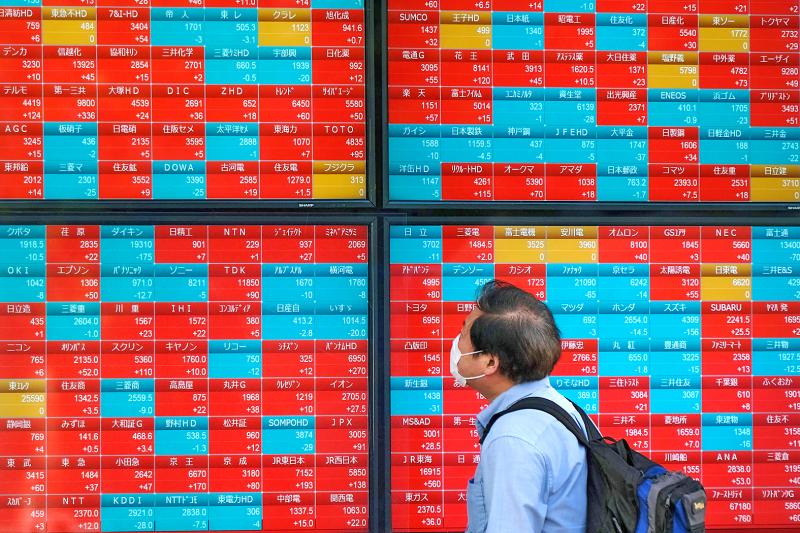Asian shares were mixed on Friday following a sell-off of technology shares on Wall Street.
In Taipei, the TAIEX closed down 0.12 percent at 12,675.95 on turnover of NT$189.942 billion, but was up 0.3 percent from 12,637.95 a week earlier.
Japan’s benchmark Nikkei 225 recouped early losses to rise 0.74 percent to 23,406.49, gaining 0.87 percent for the week. The broader TOPIX rose 0.72 percent to 1,636.64 for a weekly increase of 1.24 percent.

Photo: AFP
South Korea’s KOSPI gained 0.01 percent to 2,396.69, increasing 1.2 percent from a week earlier, while Australia’s S&P/ASX 200 lost 0.83 percent to 5,859.4, dropping 1.12 percent for the week.
Hong Kong’s Hang Seng gained 0.78 percent to 24,503.31, while the Shanghai Composite rose 0.79 percent to 3,260.35.
However, the Hang Seng and the Shanghai Composite were both down from a week earlier, losing 0.78 percent and 2.83 percent respectively.
Analysts say that investors are preoccupied with the COVID-19 pandemic and hopes for development of a safe, effective vaccine.
While Big Tech is benefiting from the shift to online life that the pandemic and stay-at-home economy has accelerated, critics said that their stocks prices have surged too high.
“Big tech stocks might have seemed like safe havens, but they have found themselves at the center of a brutal sell-off,” AxiCorp Financial Services Pty chief global market strategist Stephen Innes said.
The catch is that progress in curbing COVID-19 could hurt technology shares, Innes said.
The latest gyrations on Wall Street followed a wild stretch where the S&P 500 careened from its worst three-day slump since June to its best day in nearly three months.
The selling came as the odds lengthen that the US Congress will deliver more aid to the economy before November’s elections, support that many investors say is crucial after US federal unemployment benefits and other stimulus expired.
Partisan disagreements on Capitol Hill have kept Congress at a seeming impasse.
ING Group senior economist Nicholas Mapa said that risk aversion is dominating Asian trading with the technology sector weighing on overall sentiment.
He said that “investors are struggling to find a catalyst to reverse the recent downtrend with the much-anticipated US fiscal stimulus bill still in limbo.”
Additional reporting by staff writer

Taiwan will prioritize the development of silicon photonics by taking advantage of its strength in the semiconductor industry to build another shield to protect the local economy, National Development Council (NDC) Minister Paul Liu (劉鏡清) said yesterday. Speaking at a meeting of the legislature’s Economics Committee, Liu said Taiwan already has the artificial intelligence (AI) industry as a shield, after the semiconductor industry, to safeguard the country, and is looking at new unique fields to build more economic shields. While Taiwan will further strengthen its existing shields, over the longer term, the country is determined to focus on such potential segments as

UNCERTAINTY: Innolux activated a stringent supply chain management mechanism, as it did during the COVID-19 pandemic, to ensure optimal inventory levels for customers Flat-panel display makers AUO Corp (友達) and Innolux Corp (群創) yesterday said that about 12 to 20 percent of their display business is at risk of potential US tariffs and that they would relocate production or shipment destinations to mitigate the levies’ effects. US tariffs would have a direct impact of US$200 million on AUO’s revenue, company chairman Paul Peng (彭雙浪) told reporters on the sidelines of the Touch Taiwan trade show in Taipei yesterday. That would make up about 12 percent of the company’s overall revenue. To cope with the tariff uncertainty, AUO plans to allocate its production to manufacturing facilities in

COLLABORATION: Given Taiwan’s key position in global supply chains, the US firm is discussing strategies with local partners and clients to deal with global uncertainties Advanced Micro Devices Inc (AMD) yesterday said it is meeting with local ecosystem partners, including Taiwan Semiconductor Manufacturing Co (TSMC, 台積電), to discuss strategies, including long-term manufacturing, to navigate uncertainties such as US tariffs, as Taiwan occupies an important position in global supply chains. AMD chief executive officer Lisa Su (蘇姿丰) told reporters that Taiwan is an important part of the chip designer’s ecosystem and she is discussing with partners and customers in Taiwan to forge strong collaborations on different areas during this critical period. AMD has just become the first artificial-intelligence (AI) server chip customer of TSMC to utilize its advanced

Chizuko Kimura has become the first female sushi chef in the world to win a Michelin star, fulfilling a promise she made to her dying husband to continue his legacy. The 54-year-old Japanese chef regained the Michelin star her late husband, Shunei Kimura, won three years ago for their Sushi Shunei restaurant in Paris. For Shunei Kimura, the star was a dream come true. However, the joy was short-lived. He died from cancer just three months later in June 2022. He was 65. The following year, the restaurant in the heart of Montmartre lost its star rating. Chizuko Kimura insisted that the new star is still down